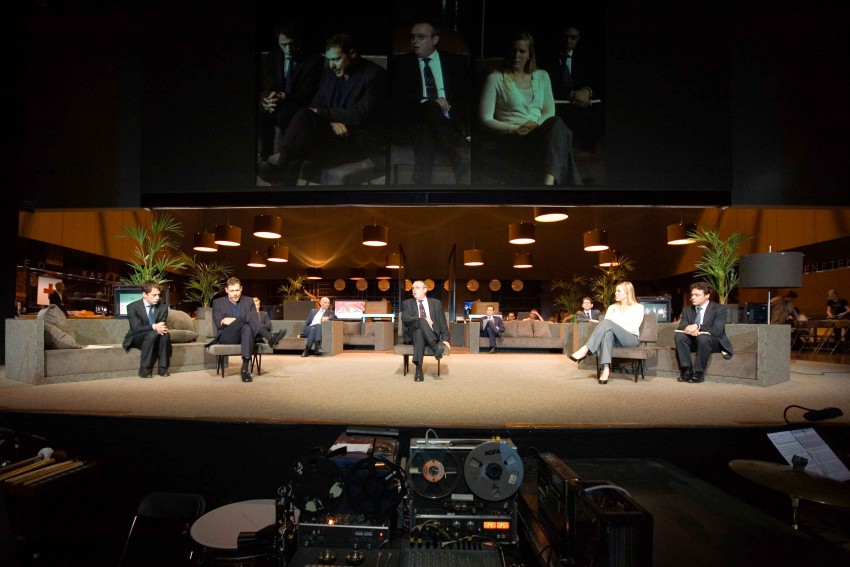Review: Roman Tragedies

Adelaide Festival Theatre
Adelaide Festival Theatre
Percussion is the mainstay of Eric Sliechim’s acoustically played and often digitally processed score for Toneelgroep Amsterdam’s shattering Roman Tragedies at the Festival Theatre, which last night gave me one of the great theatrical experiences of my life. First – the staging: the theatre’s performance space is opened up to its fullest extent, with a geometrical layout of sofas, platforms and chairs, plentiful television screens, bars for food and drink, and the actors’ makeup desk and mirrors along the left wall. Except for the last part, the audience is invited up on stage during set changes and to stay, so, comfortably seated if you wish, you can find yourself intimately involved with the action, and if the actors are out of range, you see them on video – as you do if you are in the auditorium. This five and three-quarter hour adaptation of Coriolanus, Julius Caesar and Antony and Cleopatra is performed by a cast of 14, acting with a sustained, audacious energy, rising to heights of almost frightening ferocity. The adaptation is skilful, and even though Coriolanus suffers most, the cutting still allows those who don’t know the play – and it is the least well known of the three – to follow it clearly. The production could hardly be more modern. Much is seen on video, so that if you are in the auditorium you can watch it on a half-lowered drop curtain, which carries the subtitles, or, when the actors are playing down front, watch them onstage a the same time. Handheld cameras follow the actors and the action, on one occasion right out of the theatre and onto King William Road. Running LED text gives news, and when people die, their names and dates. You are encouraged to Tweet your reactions, and these are curated for projection. Current news is also given. Television screens in the background carry President Obama, Olympic skating, and so on. The wars in the plays are presented through overamplified percussion, strobe lighting, and running titles of the war’s progress. But none of these technical aspects overwhelm the words or the acting. Hans Kesting’s Antony begins his ‘Friends, Romans, countrymen’ speech almost as a whisper, taking the microphone off its stand, and walking gently around, until with increasing anger he gets rid of it and addresses the theatre audience with just his own voice. He won the only round of applause of the night. Gijls Scholten van Aschat is the most intemperate Coriolanus I’ve ever seen – and completely believable; it’s clear that he got it from his appalling mother, Frieda Pittoors’ Volumnia. But it is the explosiveness and variety of Chris Nietvelt’s Cleopatra that is perhaps the most memorable performance of this truly remarkable production. And she has a most worthy opponent/partner in Kesting, continuing his role as Antony. Putting these three plays together, director Ivo Van Hove brings out the horror, the humanity, the pathos and the corruption of politics – and the volatility of the human temperament. Roman Tragedies is a Dutch triumph. No doubt about it. Rating: *****